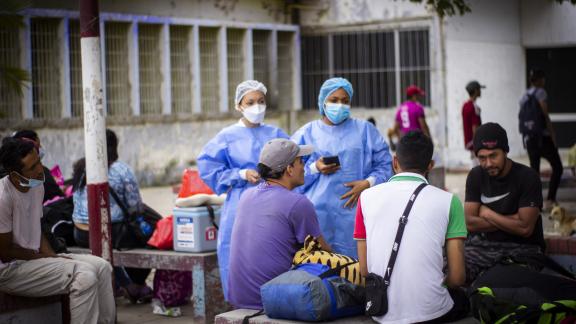In 2022, member organisations in Mexico, Guatemala, Honduras, Colombia, Venezuela, Ecuador, Peru and Chile of IPPF Americas and the Caribbean (IPPF ACRO) developed a humanitarian corridor to provide access to essential sexual and reproductive health services to people on the move in five countries in the region. This initiative emerged as an urgent response to the growing migration crisis, exacerbated by the effects of climate change, the COVID-19 pandemic, and widespread violence. The corridor offered safer passage for those crossing borders in search of protection and more dignified living conditions.
Three years later, the need to resume and strengthen this initiative is more urgent than ever. Although migration flows from some countries have decreased, as shown by the latest data from the United Nations and the quarterly update on mixed migration in Latin America and the Caribbean, the structural causes of displacement persist and have even worsened in 2025: economic crises, insecurity, state violence and extreme weather conditions continue to drive thousands of people to migrate, a situation that has been exacerbated by the United States' policy of expelling migrants.

In recent years, we have not seen any improvements in conditions for migrants, but rather an increase in the risks, vulnerability and violence experienced by people on the move. A report published in March 2025 revealed that sexual violence against migrant women in the Darién Gap had risen alarmingly: it increased by 17 percentage points compared to 2023 and 31 percentage points compared to the period from July to September 2022.
The responses of far-right governments, such as those of the United States and El Salvador, towards people on the move in the region are becoming increasingly alarming. In the United States, recent ICE raids at schools, hotels and workplaces, coupled with inhumane conditions in detention centres, are evidence of an openly punitive and exclusionary migration policy.
Meanwhile, in El Salvador, prisons have begun to receive arbitrary deportations from the United States without due process, while the Bukele regime has imposed detention conditions that have raised alarms among international organisations due to their similarity to practices of enforced disappearance. In both cases, the international community is witnessing the systematic violation of the human rights of migrants, without effective accountability mechanisms or minimum guarantees of protection.
In this context, and in the face of the progressive withdrawal of many humanitarian organisations due to funding constraints, IPPF member organisations in Latin America and the Caribbean (ACRO) remain committed to providing life-saving services. Through the migration corridor to be implemented by Mexfam, Crisálidas, Llaves, Profamilia, AVESA, CEMOPLAF, INPPARES, and APROFA, they seek to guarantee access to contraceptives, prenatal and postnatal care, care in cases of sexual violence, and other key services, with an emphasis on critical points such as the Darién and the southern border of Mexico.
IPPF ACRO is and will remain firmly committed to providing care to all people, in all contexts. We know that sexual and reproductive health needs do not stop in crisis situations. People in transit deserve dignified, accessible, and quality health services. IPPF will be there: present, supportive, and active, guaranteeing rights where they are most needed.
when
region
Americas & the Caribbean
Subject
Climate Crisis, Emergencies










